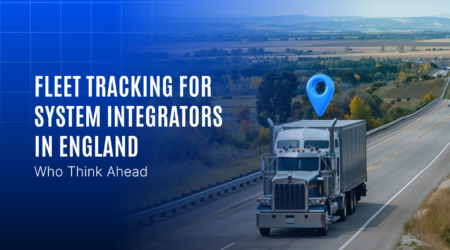What is Fleet GPS Tracking?

In today’s fast-paced world, managing a fleet of vehicles efficiently is critical for any transportation or logistics business. Fleet GPS tracking has emerged as a revolutionary technology, streamlining operations and enhancing productivity. This blog delves into the intricacies of fleet GPS tracking, shedding light on its importance, functionality, and benefits.
Understanding Fleet GPS Tracking
Fleet GPS tracking is a technology-based system used to monitor and manage vehicle fleets in real-time. It employs Global Positioning System (GPS) technology to track the location, movement, and status of each vehicle in a fleet. This system has become a cornerstone in the logistics and transportation industries, offering unparalleled visibility into fleet operations.
How Does Fleet GPS Tracking Work?
At its core, fleet GPS tracking involves three key components: the GPS device, the server, and the user interface. The GPS device, installed in each vehicle, communicates with satellites to determine the vehicle’s precise location. This data is then transmitted to a central server, where it is processed and made available to fleet managers via a user-friendly interface, often accessible through web or mobile applications.
The Necessity of Fleet GPS Tracking
Enhancing Operational Efficiency
Firstly, GPS tracking significantly boosts operational efficiency. By monitoring vehicle locations in real-time, fleet managers can make informed decisions about routing and dispatching. This real-time data helps in avoiding traffic congestions and choosing the most efficient routes, saving valuable time. Moreover, this tracking allows for better scheduling and enhances the productivity of the fleet.
Cost Reduction Strategies
Another crucial benefit is cost reduction. Fleet GPS tracking aids in monitoring driving patterns, fuel usage, and idle times. By analyzing this data, managers can identify areas where fuel consumption can be reduced and unnecessary idling can be minimized. This not only cuts down on fuel costs but also reduces wear and tear on vehicles, leading to lower maintenance expenses.
Improving Safety and Compliance
Safety is a top priority in fleet management. GPS tracking helps in ensuring driver safety by monitoring driving behaviors such as speeding, harsh braking, and rapid acceleration. By addressing these issues, businesses can reduce the risk of accidents. Additionally, GPS tracking ensures compliance with regulatory requirements, such as Hours of Service (HOS) for drivers, thereby avoiding costly penalties.
Theft Prevention and Recovery
In the unfortunate event of vehicle theft, GPS tracking plays a pivotal role in recovery. With real-time location data, stolen vehicles can be quickly tracked and recovered, significantly reducing potential losses.
Enhanced Customer Service
GPS tracking also enhances customer service. Real-time tracking information can be shared with customers, providing them with accurate delivery times. This transparency builds trust and improves customer satisfaction.
Environmental Responsibility
Environmentally, GPS tracking helps in reducing the carbon footprint of fleets. By optimizing routes and reducing idle times, it lowers fuel consumption, thereby reducing emissions. This is not only beneficial for the environment but also enhances the company’s image as a responsible corporate citizen.
Key Features to Look For
Real-Time Tracking and Updates
The cornerstone of fleet GPS tracking is the ability to track vehicles in real-time. This feature allows for immediate visibility of your fleet’s location, which is crucial for timely dispatch, route optimization, and emergency response. Real-time updates can help in making informed decisions, improving customer service by providing accurate delivery times, and enhancing overall operational efficiency.
Geofencing and Alerts
Geofencing is a feature that allows you to set up virtual boundaries around specific areas. When a vehicle enters or exits these areas, the system sends alerts. This feature is particularly useful for monitoring unauthorized use of vehicles, ensuring compliance with operational guidelines, and enhancing security measures. Alerts can also be set for speeding, idling, harsh driving, and maintenance reminders, contributing to safer driving habits and vehicle longevity.
Detailed Reporting and Analytics
A robust fleet GPS tracking system should offer comprehensive reporting capabilities. These reports provide insights into vehicle usage, driver behavior, fuel consumption, and more. By analyzing this data, you can identify areas for improvement, reduce unnecessary costs, and increase overall fleet efficiency. Customizable reports are especially valuable, as they allow you to focus on the metrics most relevant to your business needs.
Route Optimization
Route optimization is a vital feature that ensures drivers take the most efficient routes. This not only saves time but also reduces fuel consumption and wear and tear on vehicles. Efficient routing can lead to quicker delivery times, lower operational costs, and reduced environmental impact.
Integration Capabilities
The ability to integrate the GPS tracking system with other software is crucial. Integration with dispatching, maintenance management, and payroll systems can streamline operations and reduce administrative workload. Look for a system that offers easy integration with your existing software solutions.
User-Friendly Interface
A user-friendly interface is essential for the effective use of fleet GPS tracking systems. The system should be easy to navigate and provide clear, concise information. This ensures that your team can quickly adopt the system and make the most of its features without extensive training.
Scalability and Customization
As your business grows, your fleet GPS tracking system should be able to scale with you. Look for a system that can accommodate an increasing number of vehicles and offers customization options. This flexibility will ensure that the system remains valuable and effective as your fleet’s needs evolve.
Robust Customer Support
Excellent customer support is crucial for any fleet GPS tracking system. Reliable support ensures that any issues are promptly resolved, minimizing downtime and disruptions to your operations. Look for providers who offer comprehensive support through multiple channels, such as phone, email, and chat.
Industries where it is used?
Transportation and Logistics
The most apparent use of GPS fleet tracking is in the transportation and logistics industry. Companies depend on this technology for real-time tracking of goods, ensuring timely delivery, and optimizing routes for efficiency. It reduces delivery times and fuel costs, significantly boosting productivity.
Public Transportation
Public transport systems, including buses and trains, use GPS tracking for scheduling and route management. This technology enables transit authorities to provide accurate real-time information to passengers, enhancing the overall commuter experience.
Emergency Services
In the realm of emergency services, GPS tracking is crucial. Ambulances, fire trucks, and police vehicles are equipped with GPS devices to ensure the fastest response times. This can be life-saving in critical situations where every second counts.
Construction and Heavy Machinery
The construction industry employs GPS fleet tracking to monitor heavy machinery. This not only helps in tracking the location of equipment but also in scheduling maintenance, preventing theft, and ensuring the efficient use of resources.
Utilities and Service Providers
Utility companies, including those in electric, water, and telecommunications, rely on GPS tracking for their service vehicles. This assists in the quick deployment of teams for repairs, maintenance, or emergency responses, ensuring minimal downtime for customers.
Waste Management
GPS fleet tracking is also integral in waste management. It enables companies to optimize routes, ensuring timely collection and disposal while reducing operational costs and environmental impact.
Agricultural Sector
In agriculture, GPS tracking helps in managing tractors and other farming vehicles. This technology aids in efficient field navigation, crop monitoring, and resource management, playing a vital role in modern farming practices.
Conclusion
Fleet GPS Tracking is an indispensable tool in modern fleet management. Its ability to streamline operations, ensure safety, and improve customer service makes it a must-have for businesses reliant on transportation. As the technology evolves, its impact only grows, making it an investment that pays off manifold. Remember, choosing the right Fleet GPS Tracking system is key to unlocking its full potential.

